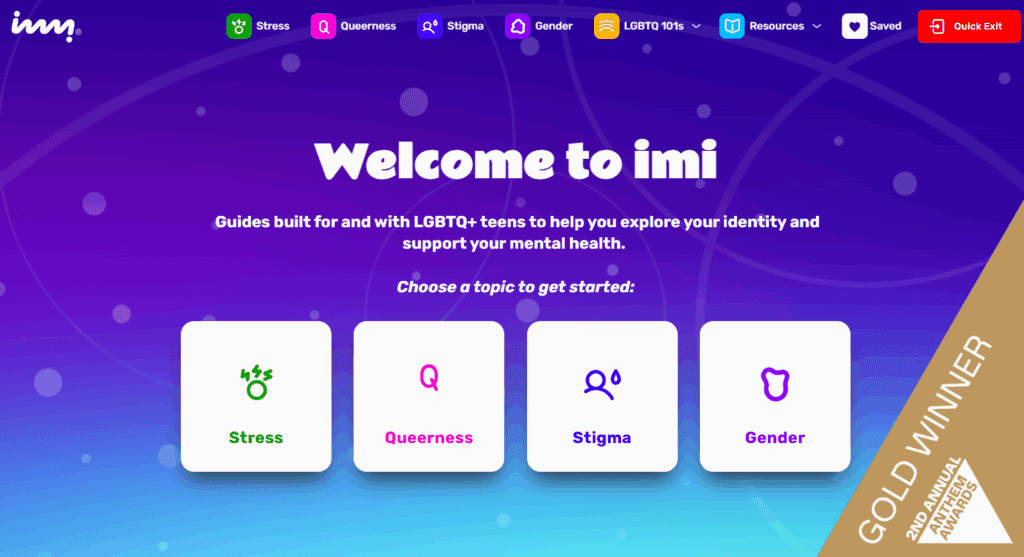imi: Advancing Digital Mental Health Support for LGBTQ+ Youth
Hopelab, in collaboration with CenterLink and the It Gets Better Project, launched imi (pronounced eye-me), a free digital mental health tool designed to support LGBTQ+ youth in exploring and affirming their identities. Recognizing the pressing need for accessible mental health resources, imi was designed with and for LGBTQ+ teens, offering evidence-based coping strategies to enhance mental well-being. A randomized controlled trial conducted by Eidos researchers demonstrated that imi effectively supports LGBTQ+ youth in managing stress. This case study highlights the challenges addressed, the collaborative work involved, and the impactful outcomes of the imi initiative.
The Challenge
LGBTQ+ youth face disproportionate mental health challenges compared to their non-LGBTQ+ peers. According to national surveys, they are significantly more likely to experience stress, anxiety, depression, and suicidal ideation due to minority stressors such as discrimination, rejection, and internalized stigma. While mental health interventions exist, many are time-intensive, in-person, and inaccessible due to geographic and financial barriers. Digital solutions present an opportunity to bridge this gap, yet research has shown that engagement with digital mental health tools is often inconsistent. Addressing this challenge required an intervention that was both scientifically validated and engaging for LGBTQ+ youth.
The Client
Hopelab, a nonprofit focused on leveraging technology for youth well-being, partnered with CenterLink and the It Gets Better Project to develop imi. These organizations are dedicated to enhancing LGBTQ+ health and resilience. Together, they envisioned a free, web-based tool that would offer LGBTQ+ teens evidence-based coping strategies tailored to their unique experiences.
The Work
Eidos partnered with Hopelab to rigorously test imi through a randomized controlled trial. The study included 270 LGBTQ+ teens, of whom 78% identified as BIPOC and 60% identified as transgender and/or gender expansive. The tool provided four core content areas:
- Gender Exploration – Encouraging youth to affirm and explore their gender identity.
- Queerness – Offering a space to reflect on and celebrate LGBTQ+ identities.
- Stress Management – Teaching coping strategies for external stressors like discrimination.
- Stigma Reduction – Helping youth combat internalized homophobia and transphobia.
imi was designed as a self-guided, interactive web application that included peer stories, exercises, and psychoeducational resources. The research team used latent profile analysis to assess engagement patterns, demonstrating that higher engagement correlated with improved stress coping mechanisms.
The Results
Eidos’ research provided compelling evidence of imi’s effectiveness:
- Participants in the intervention arm reported greater improvement in stress coping skills than those in the control group.
- High engagement users demonstrated increased positive stress appraisals, indicating improved self-efficacy in managing stress.
- The study reinforced the importance of accessible, identity-affirming digital tools for LGBTQ+ youth mental health.
- imi received industry recognition, winning a Silver Anthem Award for its impact on LGBTQ+ teen well-being. Eidos also received a Gold Anthem Award for its work with Hopelab under the Research Projects or Publications category.
The imi project demonstrates the transformative power of digital innovation in mental health, providing free, accessible, and evidence-based support tailored to the needs of LGBTQ+ youth. Co-developed with and for LGBTQ+ teens, imi has become a trusted resource for identity affirmation and stress management, particularly for those navigating intersectional challenges related to race, ethnicity, and gender identity.
Its success underscores the importance of inclusive, scientifically validated tools and contributes to broader efforts to integrate digital interventions into mental health support systems—paving the way for future innovations in LGBTQ+ health equity.
